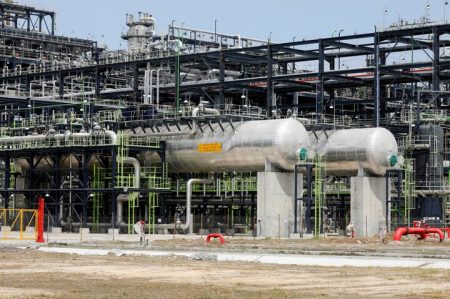…Grows production capacity to 1 million b/d
By Yemie Adeoye
IN a move targeted at reducing the importation of petroleum products and putting an end to the scarcity of kerosene President Goodluck Jonathan, yesterday unveiled an all-encompassing strategy
to almost immediately boost the nation’s refining capacity to over one million barrels per day.
The President spoke in Abuja yesterday on the implementation strategy at the official opening of the Society for Petroleum Engineers (SPE) Nigeria Annual Conference and Exhibition, (NAICE).
According to him, the nation’s refining capacity would receive significant boost in the next three years, with the coming up of three new refineries and the Turn Around Maintenance (TAM) of the four traditional refineries.
The President who was represented at the event by the Minister of Petroleum Resources Mrs Diezani Allison-Madueke stated further that with a 24-month mandate to fix the old refineries, the Nigerian National Petroleum Corporation (NNPC) has already embarked on consultation to ensure that the TAM takes off next year, which is expected to take off with Port Harcourt refinery.
“The nation’s refining capacity would receive significant boost in the next three years, with the coming up three new refineries and the TAM of the traditional refineries, which is now being handled by the companies that first built them to ensure that this time the facilities will actually give us the result that we desire in this country and take us to 95 per cent capacity utilization in all our traditional refineries.”
The Group Managing Director of NNPC, Austen Oniwon said: “We have given ourselves 24 months to raise the three refineries, we are starting with Port Harcourt refinery, and we have engaged JDP of
Japan, which is partnering with Tecnimont of Italy and they are presently in talks, with the hope that by the third quarter of next year they will move into Port Harcourt refinery and commence rehabilitation. It is not just the Turn Around Maintenance; it is the full rehabilitation of the refineries.
He clearly stated that the refineries have no limited capacity, linking the past challenges to imbalance on one of the units. He therefore noted that the needed expansion design has been done by the
licensor of the unit. So there is not going to be a major change in configuration of the facility, the plant is still the same.
On the Greenfield refineries, he said the detailed feasibility study had been being completed last July, “so our team will be going to U.K to meet with the consultant to review the feasibility study.
Thereafter, we will engage the financiers and the contractors to also examine the feasibility study and then we will be able to determine appropriately the type and the configuration of the Greenfield
refineries.” He said.
Alison-Madueke earlier expressed hope regarding the passage of the much-delayed Petroleum Industry Bill, which she said must be passed.
“We are monitoring the development in a very focus manner. We are not trying to tidy that alongside the national assembly, we are hoping that when they return from recess, it would be moved ahead speedily, because the sooner we can get it accommodated into law, hopefully before the end of this year, the better for us all. So we are working very stringently alongside the National Assembly to ensure that it is put into place and promulgated into law when it represent the most anticipated Act that we could possibly get, because this is the act that the oil and gas sector will stand on for years to come.
We are moving speedily ahead with the commercial architect of the gas industrialisation that is put in place to ensure that over the next four years, the petrochemical plant, the fertilizer blending plant, the methanol plant, the central processing facilities, the LPG distribution plants will all be fully in place and giving Nigerians the dividends in the real economy, particularly in terms of capacity building and job creation that all Nigerians deserve.”
She gave assurance on the full implementation of the Nigerian content Act, which she said is already having dynamic impact on the lives of various Nigerian operators at all levels within the downstream sector of the oil and gas industry.



